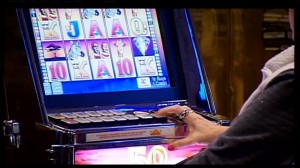After much back-and-forth, the Massachusetts Gaming Commission imposed its highly touted “managed play” regime, the first in the nation. One’s first reaction is that  it doesn’t live up to the advance hype. What was originally a carrot-and-stick plan is now no carrot and very little stick. There will be no free play for gamblers who stay within their pre-set limits and, once those limits have been exceeded, there will no longer be warning messages every 15 minutes. A 24-hour “cooling off” period for players attempting to raise their limit was also nixed. Instead, the reminders will come when John Q. Gambler hits 150% of his limit, then 200% and so on. “It’s important to provide them with the kind of information that will allow them to make an informed decision,” said Director of Research & Problem Gambling Mark Vander Linden.
it doesn’t live up to the advance hype. What was originally a carrot-and-stick plan is now no carrot and very little stick. There will be no free play for gamblers who stay within their pre-set limits and, once those limits have been exceeded, there will no longer be warning messages every 15 minutes. A 24-hour “cooling off” period for players attempting to raise their limit was also nixed. Instead, the reminders will come when John Q. Gambler hits 150% of his limit, then 200% and so on. “It’s important to provide them with the kind of information that will allow them to make an informed decision,” said Director of Research & Problem Gambling Mark Vander Linden.
The policy will be implemented at Penn National Gaming‘s racino as a test measure before being engraved in stone, which may not happen until 2017. It’s emblematic of Massachusetts‘ deep ambivalence about gambling. After all, the law that enabled casinos also required them to bear responsibility for minimizing negative social impacts. As Commission Chairman Stephen Crosby said, “The law makes this a high priority, keep problem gambling to the barest possible minimum, and we’re following the law and trying to do that.”
In other MGC business, Wynn Resorts was queried about that pesky rumor of an IRS investigation. Without acknowledging or denying the existence of such a probe, Wynn cooperated.
* Colorado voters chose last month that a bird in the hand (casinos) was worth two in the bush (racinos). Judging by numbers released by the American Gaming Association, they made a good call. According to boffins at Oxford Economics, total economic impact was $1.5 billion. Casinos won $749 million from players, which more than made up for a relatively slim contribution ($52 million) from amenities. Tax revenues came to $109 million, which ought to leave state and municipal governments fat and happy. The average casino-worker salary was approximately $47,400. “We were surprised to see how large the industry is,” admitted the AGA’s Chris Moyer.
* Law enforcement officials in Puerto Rico seized 431 illegal gaming devices (I’m guessing they mean slots), the culmination of a one-and-a-half-year undercover probe. But it’s just a drop in the coin bucket: There are an estimated 45,000 black-market gambling machines on the island.

